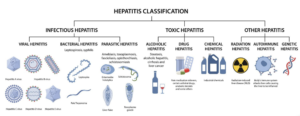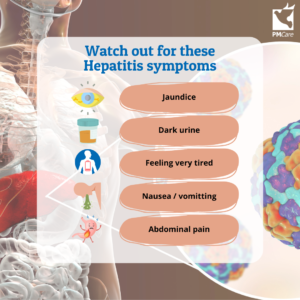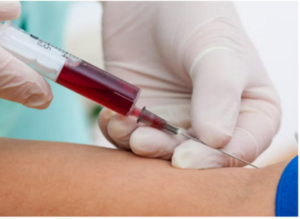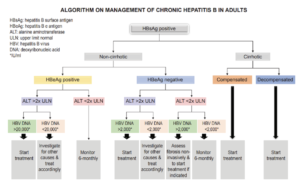Hepatitis Awareness: A Global Imperative
By Dr Helmi Ismail, Medical Advisor of PMCare
Hepatitis is a general term used to describe inflammation of the liver. Liver inflammation can be caused by several viruses (viral hepatitis), chemicals, drugs, alcohol, certain genetic disorders or by an overactive immune system that mistakenly attacks the liver, called autoimmune hepatitis. In short, this can be represented by the simplified classification below:

Of the above, the major concern is Infectious Hepatitis, particularly Viral Hepatitis. This affects millions of people worldwide.
Types of Viral Hepatitis
- Hepatitis A (HAV): Transmitted through contaminated food and water, HAV causes acute illness but rarely leads to chronic conditions.
- Hepatitis B (HBV): A major global health concern, HBV spreads through blood, sexual contact, or from mother to child during childbirth. Chronic HBV can lead to liver cirrhosis and cancer.
- Hepatitis C (HCV): The most common cause of chronic liver disease, HCV primarily spreads through blood-to-blood contact. It often remains asymptomatic until severe liver damage occurs.
- Hepatitis D (HDV): HDV infects only those already infected with HBV, exacerbating liver damage.
- Hepatitis E (HEV): HEV is usually self-limiting but can be severe in pregnant women.
Why Viral Hepatitis Awareness Matters
Viral hepatitis is singled out because it is recognised that:
- Viral Hepatitis poses a Global Burden: Over 300 million people live with viral hepatitis, leading to more than a million deaths annually.
- Deaths could have been prevented: Despite effective vaccines and treatments, hepatitis-related mortality continues to rise.
- A matter of stigma and discrimination: Lack of awareness perpetuates stigma, hindering testing, treatment, and prevention efforts.
World Hepatitis Day (WHD)
For this reason, in 2008, the World Hepatitis Alliance in collaboration with patient groups declared May 19 the first global World Hepatitis Day. Since then, every year, July 28 has been selected for us to together raise awareness through a worldwide campaign celebrated as WHO WORLD HEPATITIS DAY. The date is selected because the date is the birthday of Dr. Baruch Blumberg’s, for it was he who discovered HBV and then developed the first vaccine. On this day, we remind ourselves to keep to our resolution to raise awareness, highlight ongoing work, and encourage preventive actions.
Viral Hepatitis Disease Progression
WHO reminded that most people do not experience any symptoms when newly infected. However, some people have acute illness with symptoms that last several weeks:

When severe, acute hepatitis can lead to liver failure, which can lead to death. Although most people will recover from acute illness, some people with chronic hepatitis B will develop progressive liver disease and complications like cirrhosis and hepatocellular carcinoma (liver cancer). These diseases can be fatal.
Increasing Deaths
According to the World Health Organization (WHO) 2024 Global Hepatitis Report, the number of lives lost due to viral hepatitis is increasing. The disease is the second leading infectious cause of death globally — with 1.3 million deaths per year, the same as tuberculosis, a top infectious killer.

However, there is a suggestion of a slight reduction of new cases. We are reminded of a 2021 report of the State of Georgia which partnered with CDC in USA to launch the World’s first Hepatitis C Elimination Program way back in 2015. Georgia has reportedly reduced chronic HCV infections by 67% (Source: https://www.cdc.gov/hepatitis/global/GeorgiaHepCProg.htm).
Using a similar approach, the world can achieve the same goal. Despite the “distraction” during the COVID-19 Pandemic from 2020 to 2022, we are making an appreciable progress in Hepatitis.
How Can We Contribute?
1. Education: Spread knowledge about hepatitis transmission, prevention, and available vaccines.
Many still do not realize how unprotected they are. Any mode of protection can be functionally specific – IUCD might protect one from pregnancy but not the transfer of the virus through body fluids from one to the other through sexual contact.
Sharing needles, shaving razors, even earrings between friends/roommates carries a risk of transmission of the virus.
The transfer of hepatitis might also occur when unsterile instruments are used in surgical procedures, like circumcision and insertion of penile implants.

The good news is Hepatitis A and B is vaccination preventable. Hepatitis B is on the Malaysia National Immunisation Schedule and is provided free at Klinik Kesihatan (Health Clinics). The first dose is given at birth (usually before discharge) while the additional doses in one convenient hexavalent (and fully liquid that comprises six antigens for Hepatitis B, Diphtheria, Tetanus, acellular Pertussis, Inactivated Poliomyelitis, Haemophilus Influenza type b) vaccine.
2. Testing and Diagnosis: Encourage regular testing, especially for high-risk groups.
Individuals in high-risk professions or situations, like those in healthcare, and even those with unplanned and unprotected sexual encounters should submit themselves to blood tests to ensure they have not unknowingly been infected by the virus.

Tests are now easily available after a quick consultation with their personal clinic doctors.
3. Treatment Access: Advocate for affordable and accessible treatments.
Treatment is now available. It might not lead to a complete cure but a reduced viral load is achievable and with it a halt, or at least a slowdown, of the liver damage progression.

We have dedicated doctors and support staff at Hepatitis Clinics all over Malaysia. While the treatment cost is high, there is assistance available.
4. Combat Stigma: Promote empathy and understanding to reduce discrimination.

We need to work together as a community to protect ourselves and care for each other, to assist and alleviate sufferings, and uplift the spirit of togetherness for the good of all.
Hepatitis awareness is our collective responsibility. Let’s work together to eliminate this silent threat and ensure a healthier future for all.
Remember, knowledge saves lives. 🌟
Reference:
Programmes, G. H. H. a. S. (2024, April 9). Global hepatitis report 2024: action for access in low- and middle-income countries. https://www.who.int/publications/i/item/9789240091672
Hepatitis C Elimination Program in the Country of Georgia | CDC. (n.d.). https://www.cdc.gov/hepatitis/global/GeorgiaHepCProg.htm

